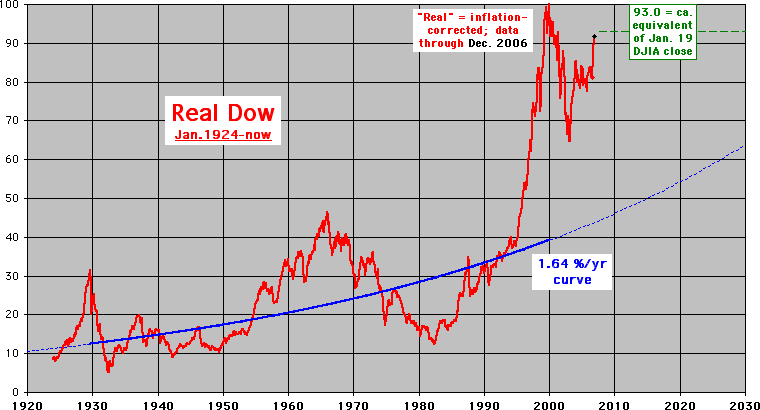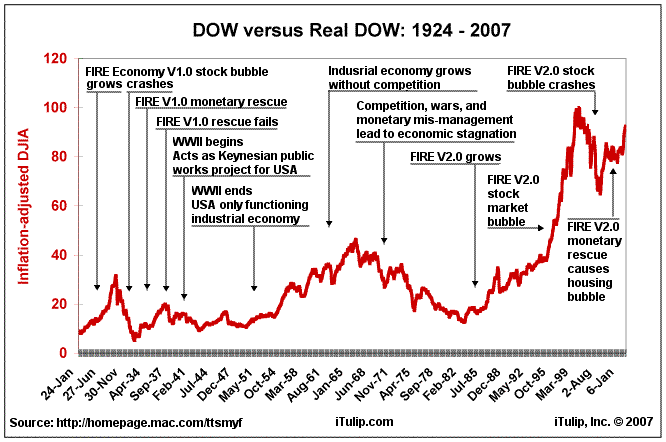 |
February 21, 2007 (Irwin Yamamoto - MarketWatch)
Market wise, equities are in the midst of the second-longest rally since 1929. Yet there are some serious warning signs -- especially sentiment.
The odds are high that the current advance won't be able to continue. Stocks remain stretched and trade above past market multiples. What goes up must come down.
On the economic front, we are overdue for a recession. The last one occurred in 2000 and 2001. Business expansions don't last forever. The boom-and-bust pattern of an economic cycle has not been repealed.
An inverted yield curve almost always points to a deep business slowdown. The Fed publicly claims there's a 40% chance of a recession. However, a model of the Federal Reserve Bank of New York is essentially forecasting an outright recession.
AntiSpin: The equity markets may be due for a fall, but don't hold your breath. They've been due for many months. Maybe they'll never go down again because there's a new equity buyer on the scene: global central banks.
Before we talk about our new buyers, predictions of an imminent crash have been coming from some unlikely places. Early December we read in Economic storm Brewing in America:
Hank Paulson, who made $700 million at Goldman Sachs before taking over the US Treasury this year... has reactivated a crisis team with a command centre in Washington to cope with the "systemic risk" in a market melt-down. His worry? 8,000 unregulated hedge funds with $1.3 trillion at hand, and derivative contracts now worth $370 trillion. "We need to be very careful here," he said.
A well-sourced article in Washington's Weekly Standard says Mr Paulson fears a "serious crisis that would be a body-blow to the US economy".
Average house prices have fallen from $244,000 in April to $221,000 last month, with more violent corrections in Florida, Arizona, and New England. Builders have warned of a "death spiral" as they slash prices to off-load a glut of unsold homes.
"The US needs a trillion dollars a year just to stand still," says David Bloom, currency guru at HSBC. Modern financial crises have always begun on the peripheries of global economy, setting off a chain reaction. Mr Bloom says the seizure this time will be at the heart of the system as the dollar buckles, pressing down on the "aorta of capitalism".
"Seizure ... at the heart of the system," "pressing down on the aorta of capitalism," and "body-blow to the US economy." David Bloom and Hank Paulson certainly have a flair for the dramatic. Might they be preparing us for something?A well-sourced article in Washington's Weekly Standard says Mr Paulson fears a "serious crisis that would be a body-blow to the US economy".
Average house prices have fallen from $244,000 in April to $221,000 last month, with more violent corrections in Florida, Arizona, and New England. Builders have warned of a "death spiral" as they slash prices to off-load a glut of unsold homes.
"The US needs a trillion dollars a year just to stand still," says David Bloom, currency guru at HSBC. Modern financial crises have always begun on the peripheries of global economy, setting off a chain reaction. Mr Bloom says the seizure this time will be at the heart of the system as the dollar buckles, pressing down on the "aorta of capitalism".
Meanwhile, the news on the U.S. economy continues to show strength. Yesterday's higher than expected CPI number and today's lower than expected jobless claims tell the story of an economy which, if it's heading into a wall, is doing so at top speed.
This story, also quoting Bloom, head of global currency research and strategy at HSBC, appeared without much fanfare a month later, in early January (caught by our jk), Central banks eye asset as well as FX shift:
Central banks around the world are looking to invest more of their $4.75 trillion foreign exchange reserves in equities at the expense of bonds, but the implications for currencies are far from clear.
David Bloom, head of global currency research and strategy at HSBC in London, notes that central banks are so flush with reserves that they barely know what to do with them. They are buying a wider range of currencies than ever and diversifying across a wider range of asset classes than ever before too.
This suggests a shift by central banks into equities, based purely on these market cap weightings, could benefit the dollar.
Given Japan's relatively low share of global equity market cap, the yen could benefit from, say, the People's Bank of China setting aside investment destined for Japanese stocks, Jen said.
"I don't believe it is a dollar versus euro tug of war, but more a major versus minors and bonds versus equities story," he wrote in a recent note. "Though China has not begun to have exposure to equities, I suspect this may be the next step."
Norway's Government Pension Fund, which saves the country's oil wealth for future generations, grew to 1.712 trillion crowns in the third quarter, or about $265.6 billion. Norges Bank, which manages the fund, has said it wants to shift the allocation of that money to 60 percent equities and increase exposure to property and private equity.
Welcome to the new central banking where the rules are: no rules. David Bloom, head of global currency research and strategy at HSBC in London, notes that central banks are so flush with reserves that they barely know what to do with them. They are buying a wider range of currencies than ever and diversifying across a wider range of asset classes than ever before too.
This suggests a shift by central banks into equities, based purely on these market cap weightings, could benefit the dollar.
Given Japan's relatively low share of global equity market cap, the yen could benefit from, say, the People's Bank of China setting aside investment destined for Japanese stocks, Jen said.
"I don't believe it is a dollar versus euro tug of war, but more a major versus minors and bonds versus equities story," he wrote in a recent note. "Though China has not begun to have exposure to equities, I suspect this may be the next step."
Norway's Government Pension Fund, which saves the country's oil wealth for future generations, grew to 1.712 trillion crowns in the third quarter, or about $265.6 billion. Norges Bank, which manages the fund, has said it wants to shift the allocation of that money to 60 percent equities and increase exposure to property and private equity.
Long term, "diversification of central bank reserves into risk assets" means keeping the equity, real estate and private equity bubbles inflated. The warnings from Paulson et al mean inflate the bubbles, but after they've crashed.
Short term, mere discussion of possible central bank purchases of risky assets is likely to lower the risk premium. Purchases and sales of treasury notes is done for the express purpose of raising and lowering short term interest rates and managing the money supply. By what principle of maintaining price stability does a central bank decide when to buy and sell property, or private and public equities? I don't know about you, but I am loath to bet against them.
Maybe the FIRE economy will go into hyper-drive. But first, the wall.
p.s. If you don't "get" today's picture, check the speedometer.



Comment